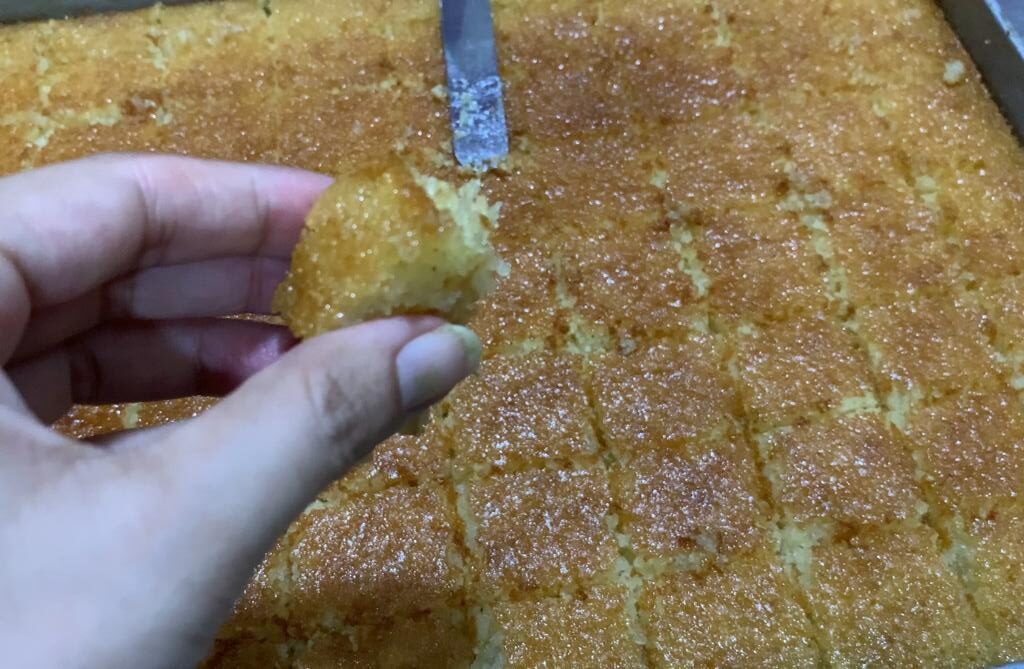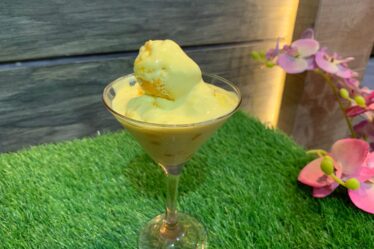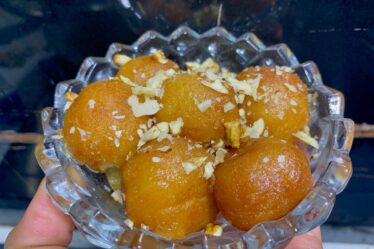
Turkish Sweet – Indulge in the divine flavors and irresistible sweetness of Basbousa, a traditional Middle Eastern dessert. That delights the senses with its delicate texture and rich taste. This delectable treat features layers of semolina cake infused with coconut, enveloped in a luscious custard, and soaked in a fragrant sugar syrup. With each bite, Basbousa offers a symphony of flavors that transports you to a realm of culinary bliss. Making it a beloved dessert cherished by many around the world.
Richness of Semolina:
Semolina, the main ingredient in Basbousa, brings a hearty and nutty flavor to the dessert. It’s a rich source of carbohydrates and protein, providing a satisfying treat that energizes the body. The addition of custard adds a luxurious creaminess to Basbousa, elevating its taste to new heights. Custard is not only delicious but also offers a dose of calcium and essential vitamins, making Basbousa a treat that’s as nourishing as it is indulgent.
Syrupy Sweetness:
The sugar syrup infuses every bite of Basbousa with a decadent sweetness that’s irresistible. It’s not just about the taste but also the texture; the syrup ensures that each morsel of Basbousa is moist and delectable. Basbousa is incredibly versatile, allowing for endless variations and adaptations. Whether you prefer it plain or adorned with nuts and dried fruits, Basbousa can be customized to suit your preferences, making it a dessert beloved by all.
Rich in Semolina:
Basbousa is made primarily with semolina, a coarse flour that is rich in nutrients such as iron, magnesium, and B vitamins. Semolina provides a hearty texture to the dessert while offering essential nutrients for overall health and well-being. The addition of desiccated coconut powder adds a delightful tropical flavor and aroma to Basbousa, while also providing healthy fats and dietary fiber. Coconut is known for its potential health benefits, including supporting heart health and aiding digestion.
Protein and Calcium:
Ingredients such as milk powder, yogurt, and eggs contribute to the protein content of Basbousa, while also providing essential nutrients like calcium for bone health and muscle function. Basbousa strikes the perfect balance of sweetness, with sugar used judiciously in both the cake batter and the sugar syrup. This allows you to indulge in a sweet treat without overwhelming your taste buds or compromising your health goals.
Why We Love It:
Basbousa holds a special place in our hearts for its enchanting flavors, comforting texture, and cultural significance. Whether enjoyed as a decadent dessert for special occasions or as a comforting treat on a cozy evening. Basbousa never fails to evoke feelings of warmth and nostalgia. From its aromatic coconut aroma to its moist and tender crumb, every aspect of Basbousa is designed to delight. And enchant, making it a cherished favorite among dessert enthusiasts worldwide.
Conclusion:
Basbousa is more than just a dessert—it’s a celebration of tradition, flavor, and indulgence. With its harmonious blend of semolina, coconut, custard, and syrup, Basbousa offers a sensory experience like no other, inviting you to savor each moment of sweetness and delight. Whether shared with loved ones or savored in solitude, Basbousa is a testament to the joy found in simple pleasures and the beauty of culinary craftsmanship.

Turkish Sweet - Turkish Basbousa
Ingredients
For the Soji Mix
- 2 cups semolina (soji)
- ½ cup 1/2 cup desiccated coconut powder
- 1 tsp baking powder
- ¼ cup milk powder
- ¼ cup condensed milk
- 1 cup sugar
- 1 cup ghee (clarified butter)
- ½ cup nestlé yogurt
- 2 eggs
For the Custard Layer
- 1 cup milk
- ½ cup sugar
- 3 tbsp custard powder
For the Sheera (Sugar Syrup)
- 1 cup sugar
- 1 cup water
Instructions
Prepare the Soji Mix
- In a mixing bowl, combine semolina, desiccated coconut powder, baking powder, milk powder, condensed milk, sugar, ghee, Nestlé yogurt, and eggs. Whisk the ingredients until you have a smooth batter.
Bake the Soji Mix
- Preheat your oven to 180°C (350°F). Spread a thin layer of the prepared soji mix in a baking pan. Bake for 10 minutes or until it becomes lightly golden brown.
Prepare the Custard Layer
- In a saucepan, mix milk and sugar. Add custard powder and whisk until smooth. Cook the mixture over medium heat until it thickens. Remove from heat.
Layering and Baking
- After the first layer of soji mix has baked and slightly cooled, spread a layer of the custard mixture over it. Then, add another layer of the remaining soji mix over the custard layer.
- Bake for an additional 10 minutes or until the top layer becomes golden brown.
Prepare the Sheera (Sugar Syrup)
- In a separate saucepan, combine sugar and water. Cook over low heat until the sugar dissolves, and the mixture thickens to a syrupy consistency.
Final Assembly
- Once the Basbousa is baked and still hot, pour the hot sugar syrup evenly over it. The Basbousa will absorb the syrup.
Cool and Serve
- Allow the Basbousa to cool completely in the pan. Cut it into square or diamond-shaped pieces.
Video
FAQs (Frequently Asked Questions):
Can I use butter instead of ghee in the recipe?
Yes, you can substitute butter for ghee if desired. However, ghee lends a unique flavor and richness to Basbousa, so using ghee is recommended for an authentic taste.
Can I add nuts or dried fruits to Basbousa for extra texture?
Absolutely! Chopped nuts such as almonds, pistachios, or walnuts, as well as dried fruits like raisins or chopped apricots, can be added to the Basbousa batter for additional flavor and texture. Simply fold them into the batter before baking.
How should Basbousa be stored to maintain its freshness?
Basbousa can be stored in an airtight container at room temperature for up to 3 days. Alternatively, you can refrigerate Basbousa for longer shelf life, but be sure to bring it to room temperature before serving to restore its soft texture and enhance its flavor.



